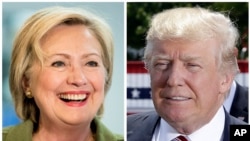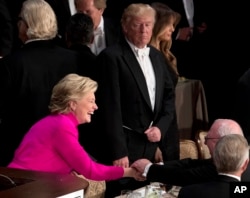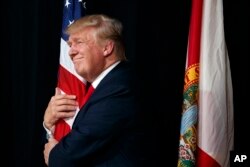In early 2015, people working for Hillary Clinton offered opinions on whether she should attend a Clinton Foundation meeting in Morocco.
The workers were assisting Clinton in her campaign to become the presidential candidate of the Democratic Party.
One aide, Huma Abeden, wrote an email saying that Morocco’s King promised $12 million to the foundation and to pay for the costs for the meeting. She wrote that “if HRC was not part of it, meeting was a non-starter.” HRC are the initials of Clinton’s full name, Hillary Rodham Clinton.
The Abeden email is among more than 20,000 taken without permission from the Clinton presidential campaign. A group called WikiLeaks is releasing the emails on the Internet. It said the release would continue until November 8th, which is Election Day in the United States.
Clinton is the Democrats’ candidate for president. Her campaign says the emails were stolen by groups linked to the Russian government. It claims some of the emails may have been doctored. To doctor, means to change the words in a message to create a different meaning.
Donald Trump, Clinton’s main opponent, has been using the leaked emails to criticize her at recent campaign events.
Last Friday in North Carolina, Trump said the Abeden email showed money given to the Clinton Foundation gave the donors a chance to meet with Clinton.
“Now from WikiLeaks, we just learned she tried to get $12 million from the king of Morocco for an appearance," Trump said.
Clinton Campaign Denies Special Treatment for Donors
Clinton campaign aides reject Trump’s criticism. They said she did not attend the Clinton Foundation meeting in Morocco. Instead, her husband, former President Bill Clinton, and daughter Chelsea went there.
“This has come from the highest levels of the Russian government,” Hillary Clinton said, during her debate with Trump last week. “Clearly from (Vladimir) Putin himself in an effort, as 17 of our intelligence agencies have confirmed, to influence our election.”
What the Emails Show
But the emails raise possible ties between Hillary Clinton’s work as Secretary of State and the Clinton Foundation.
The foundation was formed in 1997 while Bill Clinton was still president. The organization says it provides services and assistance to people in 185 countries.
In 2012, an email posted by WikiLeaks says that a representative of the government of Qatar hoped to get 5 minutes with Bill Clinton. The representative wanted to give Bill Clinton a $1 million check for the Clinton Foundation. It was described as a birthday gift to Bill Clinton from the previous year.
There is no information available as to whether he ever met with the Qatar official.
People Considered for Vice President
Other emails show some of the inside workings of the Clinton campaign.
For example, one email in March from campaign chair John Podesta offers a long list of possible choices for consideration as her vice presidential candidate. Among them are business leaders Tim Cook and Howard Schultz, along with Bill and Melinda Gates. The Gates chair a charitable foundation and Bill Gates cofounded Microsoft, the technology company, in 1975.
Also on the possible vice presidential list was Senator Bernie Sanders of Vermont. He lost out to Clinton for the Democratic presidential nomination.
Clinton ended up choosing Virginia Senator Tim Kaine.
In another email, Clinton aides discuss how to make sure the campaign’s top leadership had representation from women, different races and ethnic groups.
An email from Clinton lawyer Cheryl Mills breaks it down this way: "Four 'POC,'” or people of color, “four women assuming COO (chief operating officer) is a white woman and six white men.”
What She Told Paying Audiences from Top Banks
The emails include details on what Clinton told banks and other financial groups during a series of paid speeches after she left the government in 2013. She gave 100 speeches and was paid over $21 million, according to the Associated Press.
During her race against Sanders, Clinton refused to release copies of her paid speeches.
In one speech included in the leaked WikiLeaks emails, Clinton said the government had to crack down against financial industry abuses for political reasons.
“If you were an elected member of Congress and people in your constituency were losing jobs and shutting businesses and everybody in the press is saying it’s all the fault of Wall Street, you can’t sit idly by and do nothing,” she said.
In another speech, Clinton said she is “kind of far removed” from the middle class life she talks about while campaigning.
She also said it is hard to use military action to settle world problems because the decision will be leaked to news organizations by people “who want credit for it.”
Some Democrats have accused WikiLeaks and the Russian government of trying to help Trump win the election.
Don Haider-Markel is chair of the political science department at the University of Kansas. He does not believe the release of the emails will have much effect on the election.
“Most people have made up their minds,” he said. “Among those that have not, they would just as likely use this information to rationalize not voting on Election Day as they would to choose one candidate over another.”
I’m Bruce Alpert.
Bruce Alpert reported this story for VOA Learning English. George Grow was the editor.
We want to hear from you. Write to us in the Comments Section and share your views on our Facebook Page. Would you be worried if someone got to read your emails?
________________________________________________________________
Words in this Story
foundation - n. an organization that is created and supported with money that people give in order to do something that helps society
inside - adj. coming from people running an organization
charitable - adj. done or designed to help people who are poor, sick or have other problems
crack down - v. a serious attempt to punish people for doing something that is not allowed
constituency - n a group of people who support or who are likely to support a politician or political party
idly - adv. without much thought, effort, or concern







